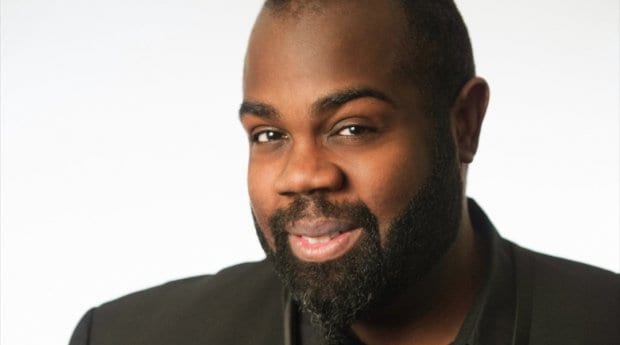Calling himself a “modern-day paradox,” gay American countertenor Reginald Mobley says the invitation to participate in Vancouver’s Queer Arts Festival took him by surprise.
“I felt like honestly saying: ‘I’m a heavy-set black guy, are you sure you want me? You kind of come with that baggage, coming from the States,” he says.
“I’ve been told I look like an NFL linebacker and people have asked me if I’m lost and looking for the football training room,” he says, with a laugh.
“In the churches where I’ve gone to sing, they’ve assumed that I’m the custodian or janitor,” he adds.
Mobley, whose vocal range is equivalent to that of a female contralto or mezzo-soprano, hits operatic notes that some might consider too delicate for his appearance, too fragile for his bold candour.
His voice has been called “tender” and “intimate,” and “natural and sweet.”
Despite this, or possibly because he challenges some people’s expectations, he faces discrimination in his home country and especially in the gay community.
“Because I’m a black man, I haven’t felt welcomed by the gay community at large,” he says.
“The bulk of discrimination I’ve faced in the US has been because I’m black. In music all of my discrimination has been based on my colour as opposed to my sexuality. Being gay in the arts hasn’t hurt me,” Mobley says. “In America, gay people are seen as the cultural caretakers of the arts.”
But within the gay community, he says, discrimination on the basis of physical appearance, race and age persists, and many queer events tend to target young, Caucasian, buff men.
So Mobley will bring his larger-than-life talent and beautiful voice here, to pay homage to gay composers — or rumoured gay composers — of the 17th century, such as German Baroque composer, Johann Rosenmüller.
“I have to be very careful because it might piss a lot of people off because I’m daring to suggest that composers might be gay,” he says — “that they might be more than the textbook default of heternormative.
Speculation surrounds Rosenmüller’s sexual orientation, and a 1655 scandal involving alleged homosexual activities landed him briefly in prison before he escaped. Still, Mobley says, performing a recital based on the works of rumoured gay composers is subversive.
Historical records of the early music genre and its celebrated composers lack identifiable labels of “gay” or “queer,” Mobley notes, so there is no way to confirm many artists’ sexual orientation.
“We don’t have Handel’s ‘gay card’ and we didn’t have Schubert being out loud and proud,” he says.
“Oscar Wilde didn’t have a Grindr account, but we knew he was gay,” Mobley adds, with a laugh.
Matthew White, artistic director of Early Music Vancouver, collaborated with Queer Arts Festival organizers to bring Mobley to Vancouver.
“I thought [Mobley’s] singing was extremely beautiful. His tone was melodic and soft-grained. I liked him right away,” White says.
“[Mobley] being black and gay didn’t really matter in my decision,” White adds. “It’s not that I don’t care about those things, but what I’m interested in is the music, and he does that beautifully.”
Countertenor Reginald Mobley will perform A Queen’s Music on Thursday, Aug 6 at 7:30pm at the Roundhouse Community Centre, 181 Roundhouse Mews, in Vancouver. Tickets $20-40. To purchase tickets and for more information go to the Queer Arts Festival website.

 Why you can trust Xtra
Why you can trust Xtra


